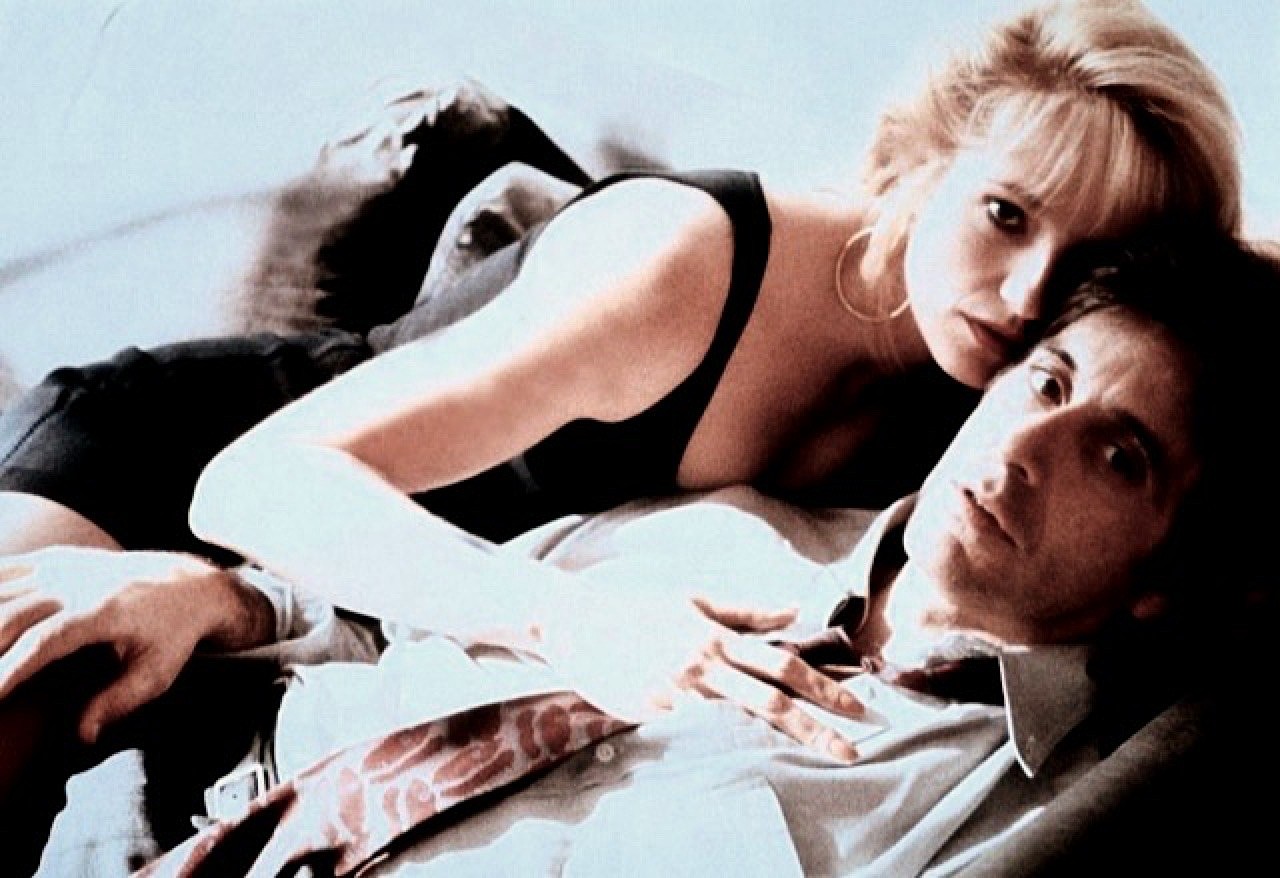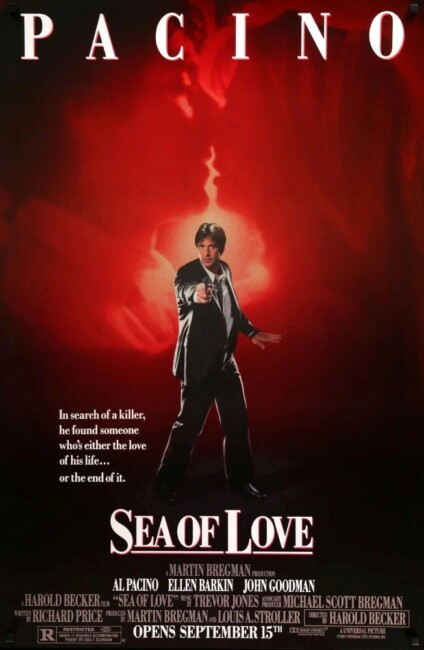Crew
Director – Harold Becker, Screenplay – Richard Price, Producers – Martin Bregman & Louis A. Stroller, Photography – Ronnie Taylor, Music – Trevor Jones, Production Design – John Jay Moore. Production Company – Universal.
Cast
Al Pacino (Frank Keller), Ellen Barkin (Helen Cruger), John Goodman (Sherman Tilley), Richard Jenkins (Gruber), William Hickey (Frank Keller Sr), John Spencer (Lieutenant), Michael Rooker (Terry)
Plot
Middle-aging police detective Frank Keller investigates a series of killings wherein men are found murdered, having been stripped naked and shot in the back of the head and copy of the 45″ single ‘Sea of Love’ left playing on the turntable. Each victim is found to have placed an ad that contains poetry in a singles magazine. Keller believes the killer is a woman, so he and his partner attempt to draw the killer out by placing ads with poetry in the magazine and posing as singles. Despite himself, Keller is drawn to Helen Cruger, one of the woman he meets. However, as Keller becomes involved with Helen, all the evidence points to her being the killer.
Sea of Love was a massive success and earned Al Pacino a Golden Globe nomination. About the only place it received no notice at all was within the genre, which totally overlooked its psycho-thriller and serial killer plot. The plot bears a surprising resemblance to Basic Instinct (1992), which came out three years later. Both films have the same story of a cop being drawn into a heated sexual relationship with a woman who may or may not be the central suspect in a sex murder investigation, with the film’s suspense centring around the revelation of clues that appear to implicate her in the murders.
Sea of Love is one of the most enjoyable films one has watched in some time. Everything about it works – the stars, the script, the director – it is one of the joys that manage to sneak out of the major studios despite the major studios. Pacino excels. The role is the same moody New York cop part that Pacino perfected in films like Serpico (1973) and Cruising (1980), only this time all of Pacino’s interior moodiness has been replaced by a roughcast sensitivity and the film turned into a romantic thriller. Paired up against him, Ellen Barkin has a fierily sensual presence that sets the film smouldering – one scene with she and Pacino seducing the other in a supermarket is incredibly provocative.
The one other exceptional performance in the film – indeed, one that often succeeds in stealing the film out from under Pacino and Barkin – comes from John Goodman. Goodman is a marvellous comic performer, having a face that can tease and light up in mock impersonations with the pace of a Warner Brothers cartoon. Added to the big lug likeability of the character here, it becomes an exceptional performance – the look of embarrassment on his face when Pacino catches him with Gina is memorable.

Indeed, the entire film is filled with memorable moments like these, scenes that do not advance the plot but act as wonderful little vignettes or character observations on their own – the scenes near the beginning where the police drag criminals with outstanding warrants into a fake Meet the Yankees game; Al Pacino’s face-off with the armed bodyguard; or his meetings with the various women in the restaurant and the look of hurt and betrayal on Barbara Baxley’s face when she (intoxicatedly) walks out of the restaurant later on, having seen him with the other women.
It is a superb script. The elegance of the surprise twists and dramatic turns – the way that suspicion regarding Ellen Barkin is drawn in then relaxed and then twisted around and intensified again – is outstanding. In his subsequent films – Malice (1993), Mercury Rising (1998) and Domestic Disturbance (2001) – director Harold Becker has disappointed, invariably because the scripts have lacked the sophistication of the one here, the sole exception being City Hall (1996), where he again teamed with Al Pacino.
The film chooses its title exceedingly well, the song it derives from manages to doubly stand as a metaphor for the whole singles dating game the plot centers around. Tom Waits’s craggy voiced rendition of Phil Phillips’ original song Sea of Love (1959) over the end credits is absolutely superb.
The script comes from Richard Price, a veteran screenwriter who has also written the likes of The Wanderers (1979), Color of Money (1986), one of the episodes of New York Stories (1989), Clockers (1995) based on his novel, Kiss of Death (1995), Ransom (1996), Shaft (2000), Child 44 (2015) and as developer of the Stephen King adapted tv series Sea of Love (2020).


